The occasion, of course, is the May 1 holiday, International Workers' Solidarity Day. During the Soviet era, May 1 was one of the most important celebrations, with huge demonstrations and parades through Moscow's Red Square. As you can see, today it's not just the Communists that still come out to demonstrate, as groups from all across the political spectrum take to the streets to make their voices heard.
Nonetheless, deciding which march and rally I was going to follow was an easy choice. I've never been in Moscow for a major Communist demonstration, something I've always wanted to see. One of my biggest regrets is the fact that I went to Estonia in November 2000 while I was studying in Moscow. I don't regret Estonia - it's a beautiful country - but I do regret missing the traditional demonstration marking the anniversary of the Revolution of 1917. I also regret missing the post-election party held at the U.S. Ambassador's residence following the (at the moment) inconclusive U.S. presidential election. I could have gone to the party had I been in town, and later found out that the likes of Gorbachev and Zyuganov were in attendance. Talk about awkward chit-chat over the punch bowl...
Besides, May Day is the Communists' holiday. I resolved that I would follow their march. The rally began beneath the massive statue of Lenin at Kaluzhskaya (Oktyabrskaya) Square:
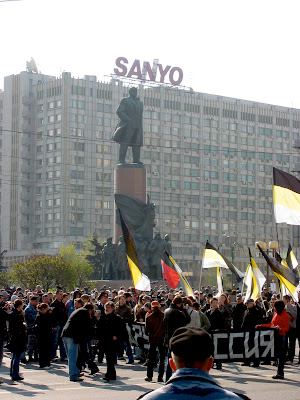
As usual, there were plenty of OMON riot police from keeping the babushkas and dedushkas in line:
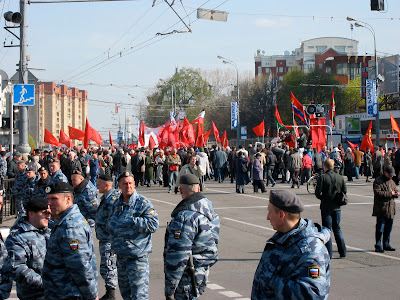
Fortunately in today's Russia, you can get a cup of coffee before joining up with the Moscow Oblast Committee of the CPRF:
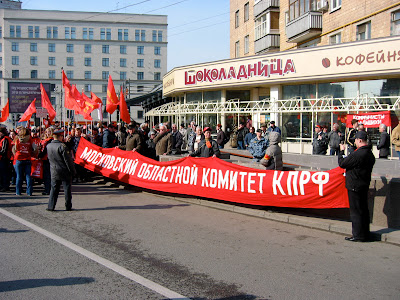
While the vast majority of marchers were elderly (as expected), there were plenty of young people there representing the Vanguard of Red Youth and various regional Komsomol chapters:
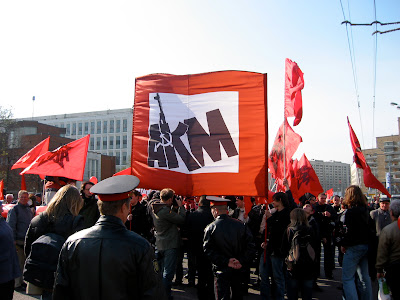
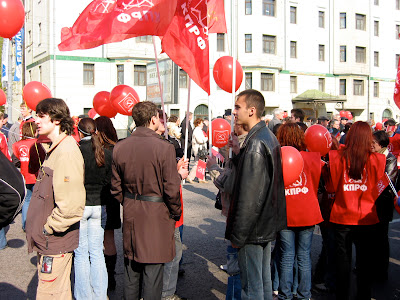
I managed to squeeze my way to the front of the line and got some photos of Gennady Zyuganov, First Secretary of the CPRF, the man who almost became president in 1996.
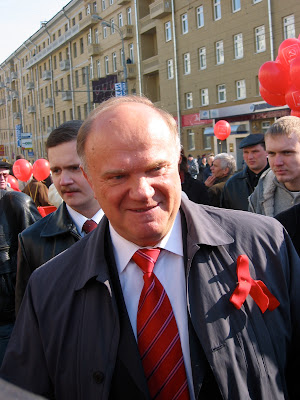
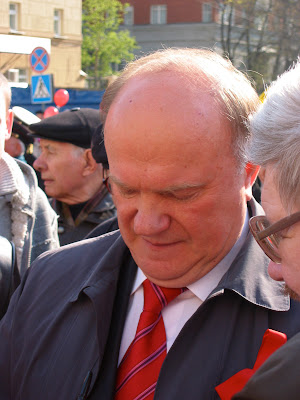
Even Moscow State University was represented. I briefly considered joining up with my "adopted" alma mater, but decided it would be more interesting up at the head of the pack.
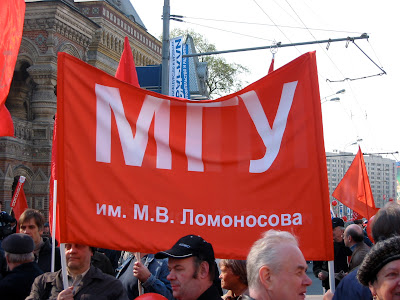
Lenin used to have an "Agitprop" train (agitation & propaganda) that would travel around spreading the Bolsheviks' message. Now they have the Agitprop microbus:
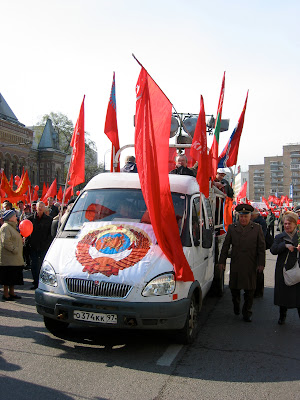
Amidst the red flags were several people carrying homemade signs with homemade messages, including this family of anti-globalists:
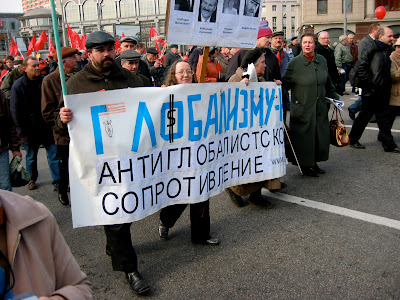
As I was at the front of the crowd, I didn't realize how large the demonstration was until I turned around and saw what was following us:
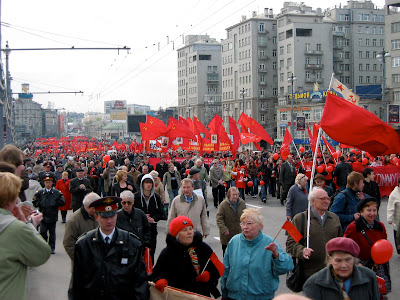
Zyuganov must have given thought to his politicla nemesis of the 1990s, Boris Yeltsin, as we passed the cathedral where Yeltsin was laid to rest last week:
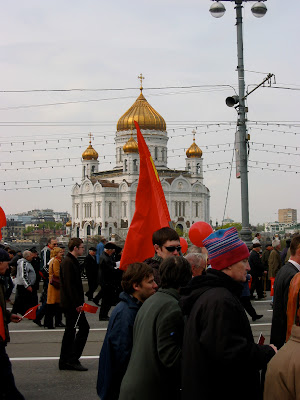
Not surprisingly, the march didn't move very quickly, and the babushkas and dedushkas would slow noticably when we reached even the smallest of inclines. In fact, the distance between the starting point and Teatralnaya Square where the march ended is pretty long. I was a bit worried that some of their tickers wouldn't make it. Nonetheless, the slow pace allowed me to get out in front of the whole group of protesters for some photos:
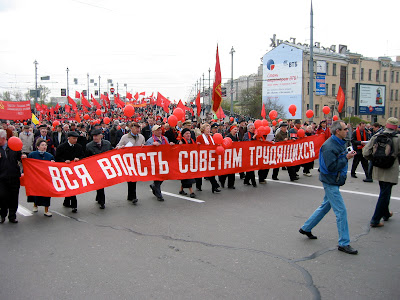
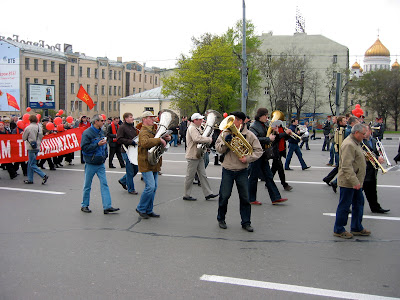
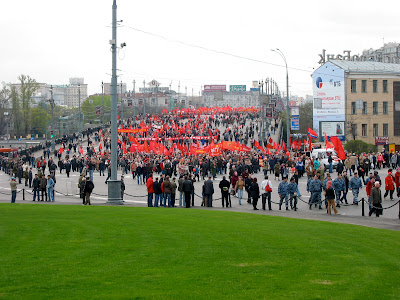
Taking the lead of the professional photographers, I scurried out in front and right up to Zyuganov with my camera. His bodyguard warned me, "take the photo and get out." So that's what I did.
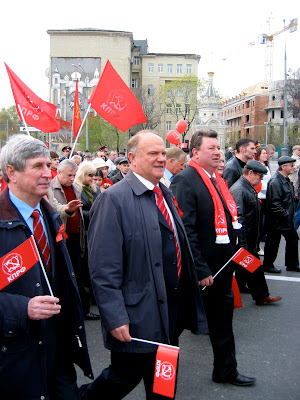
This young police officer couldn't keep a straight face as he was being lectured by the newspaper-wielding babushka. Remember, people: don't mess with the babushkas.
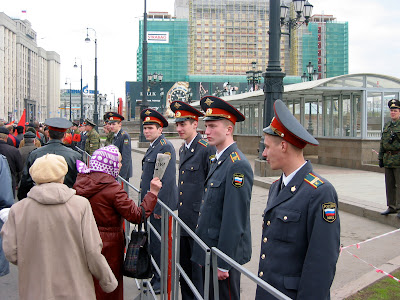
This police officer and I exchanged knowing smiles as we both took interesting photos: Me taking photos of him taking photos of the crowd with his cell phone camera.
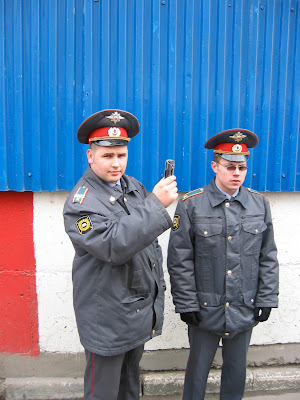
And of course I had to smile when we passed this billboard. At least she had the decency to put on a red dress for the occasion!
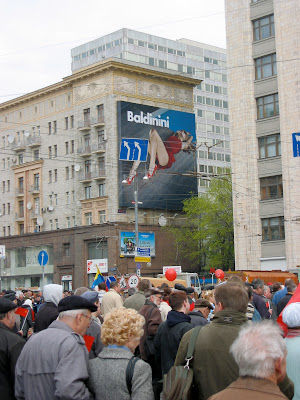
Eventually the marchers arrived at Teatralnaya Square. The best line I heard all day was from a speaker who declared, "Comrades, welcome to Sverdlov Square, temporarily renamed Teatralnaya Square." For those of you who don't get the joke, the Soviet-era name was changed in 1991, and I don't get the feeling that it's all that temporary...
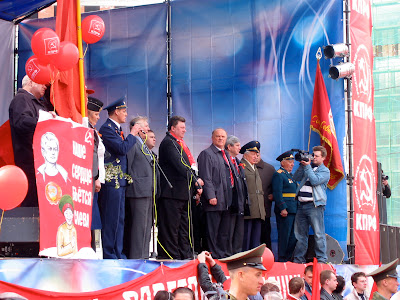
Everyone's favorite members of the Communist pantheon were represented:
Marx (squared):
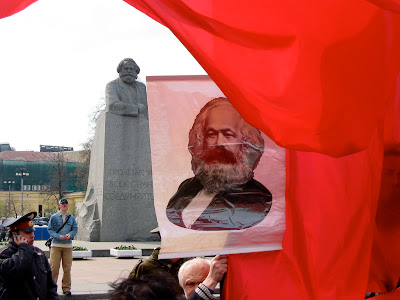
Engels, the guy everyone forgets about:
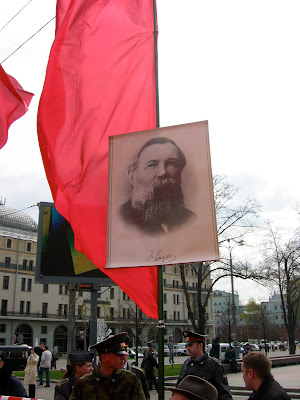
Grandpa Lenin and Great Grandpa Karl:
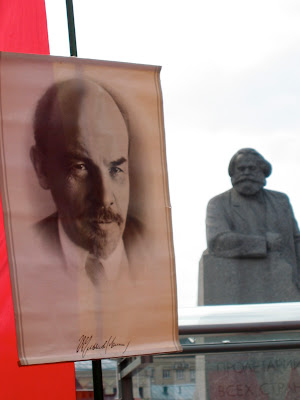
And of course, Uncle Joe, who always makes a scene at family get-togethers:
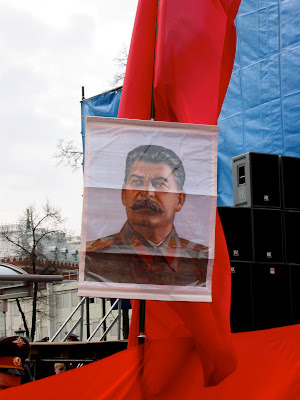
There were several other interesting homemade signs at the protest:
This one portrays Belarusian president Alexander Lukashenko in support of the Russia-Belarus Union:
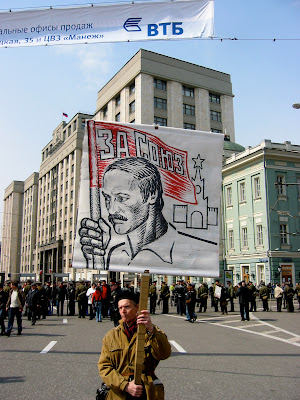
On the reverse of the same sign is a depiction of Yeltsin draining the blood of Russia in order to save his own life:
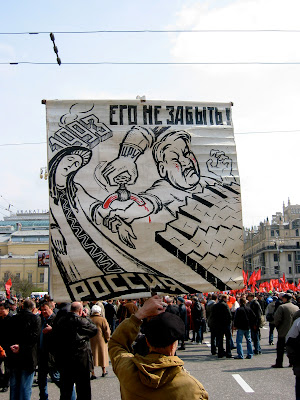
This one states, "Under 'the bears' you will live in a den," a play on words using the Russian word for "bear" (medved) in reference to one of Putin's possible successors, Dmitri Medvedev:
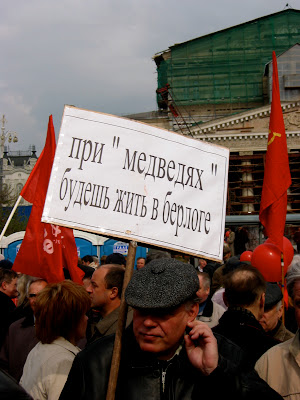
Finally, this tasteful number... It states, "In Hell there's a new election for the devil in connection with the arrival of a new candidate. Vote!"
You can see for yourselves who the old and new candidates are...
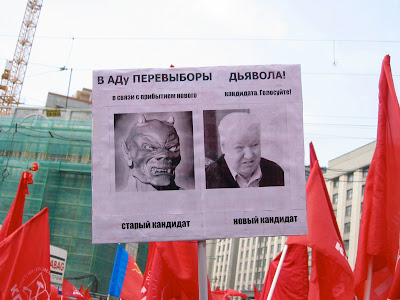
As for the speakers up on stage, there was nothing too interesting or new going on - the same old message, the same old slogans. They did refer to the current unrest in Estonia surrounding the removal of the Bronze Soldier monument, but other than that it was a pretty bland demonstration. While they may still be the largest opposition group in Russia, it's easy to see that they're not the most impassioned group.
And so, after a while I got bored and decided to go in search of some of the other rallies, heading up toward the Lubyanka:
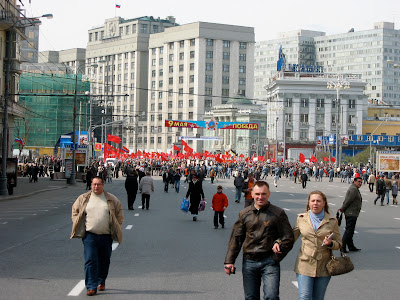
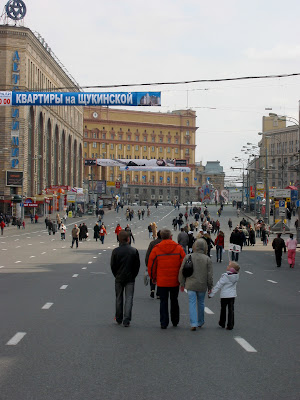
Stay tuned for part 2...
See the rest of the day's photos here.







